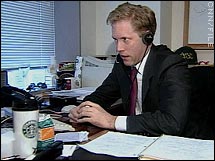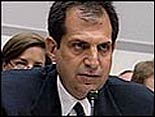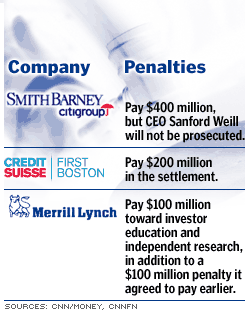NEW YORK (CNN/Money) -
An investigation into wrongdoing on Wall Street climaxed Monday when 10 securities firms agreed to pay $1.4 billion and change the way they do business by separating stock market research from investment banking.
The deal between the firms -- including Citigroup, Merrill Lynch and Goldman Sachs -- and securities regulators from around the nation ends an embarrassing stretch for an industry accused of deceiving investors with tainted stock market research designed to win investment banking fees.
"I am profoundly saddened and angered by the conduct that is alleged," said William Donaldson, the chairman of the Securities and Exchange Commission, who spoke at a Washington news conference.

Two analysts who followed boom-and-bust sectors of the late 1990s were named. Henry Blodget, who covered Internet stocks for Merrill Lynch, and Jack Grubman, a former telecom analyst at Salomon Smith Barney, have been barred from the business. Blodget will pay $4 million to settle the charges against him; Grubman is handing over $15 million.
The 10 firms must sever the links between stock research and investment banking, compensate analysts based on the accuracy of their stock picks, and reform how initial public offerings are distributed. They'll also pay a total of $1.4 billion that will go partially to funding the kind of independent research whose absence, regulators say, led to thousands of money-losing investment decisions during the stock market boom that ended three years ago.
Other firms involved in the deal include Bear Stearns & Co. Inc., Credit Suisse First Boston LLC, Lehman Brothers Inc., J.P. Morgan Securities Inc., Morgan Stanley & Co., UBS Warburg LLC, and U.S. Bancorp Piper Jaffray Inc.
The strongest language was reserved for CSFB, Merrill Lynch and Citigroup's Salomon Smith Barney unit, which the regulators say issued "fraudulent" research reports. That could open the banks to lawsuits from shareholders seeking monetary damages because they followed Wall Street's investment advice.
 |
|
| Henry Blodget, formerly of Merrill Lynch. |
"We can not and will not let these investors down," said Christine Bruenn, Maine's top securities regulator and president of the North American Securities Administrators Association.
The $1.4 billion includes $487.5 million in penalties, $387.5 million in disgorgement, $432.5 million to fund independent research and $80 million for fund investor education. Half of $775 million paid by the firms other than Merrill Lynch will go to investor restitution.
The penalties will not cripple the banks, which are barred from deducting them from taxes. Citigroup's net income, for example, rose 6 percent to $15.2 billion in 2002.
Still, the two-year investigation has hurt the reputation of the securities industry, which has been cutting tens of thousands of jobs to save money during the worst bear market in a generation.
 |
|
| Jack Grubman |
New York Attorney General Eliot Spitzer said practices of late-1990s Wall Street hurt the confidence of investors duped by tainted advice.
"What we demand is integrity and honesty of the research that is rendered," said Spitzer, who kept the highest regulatory profile during an investigation that coincided with the stock market's worst tumble in a generation. Without elaborating, Spitzer said there will be further actions against individuals linked to analyst conflicts of interest and other related wrongdoing. "Just wait," he said.
The deal comes four months after the firms agreed with state regulators, the New York Stock and Exchange, the National Association of Securities Dealers and the SEC to the rough outline of Monday's pact. As is customary, the 10 neither admitted nor denied the charges.
The firms long ago volunteered some reforms. Merrill Lynch brokerage research notes, for example, already contain lengthy disclosures about the Merrill's investment banking interests. Analysts at A.G. Edwards, a regional brokerage not involved in the settlement, must tell reporters if they own stocks that they cover. Citigroup last year hired Sallie Krawcheck, well-regarded for her independent research, to split the firm's research and banking departments.

The banks have prepared for this day. J.P. Morgan, for example, set aside $900 million this year to pay for lawsuits. J.P. Morgan is paying $80 million, the same amount owed by Bear Stearns, Lehman Brothers, and UBS Warburg.
Citigroup is paying the largest amount, $400 million, followed by Merrill Lynch (MER: Research, Estimates) and CSFB, which are both paying $200 million. Payments total $125 million for Morgan Stanley (MWD: Research, Estimates), $110 million for Goldman Sachs (GS: Research, Estimates), and $32.5 million for Piper Jaffray, the smallest of the firms. An 11th firm, Deutsche Bank, is expected to settle.
A new wave of litigation could come after lawyers representing shareholders pour over the SEC's civil complaints filed in U.S. District Court in the Southern District of New York. With e-mails and statistics, the documents outline alleged improprieties including the private critiques of stocks that were publicly touted.
Click here for details from the SEC's Web site
In one example, an unnamed UBS Warburg telecom analyst issued positive recommendations on an investment banking client, Interspeed, even though he privately said the stock should be shorted, according to the settlement. Morgan Stanley's solicited investment banking business by telling potential clients that stocks covered by Morgan Stanley analysts rose following their initial public offerings, the regulators said.
But investors appear to be betting that better times lie ahead for the securities industry. Shares of Citigroup (C: Research, Estimates), for example, are up 11 percent this year after falling 30 percent in 2002. The Amex Securities Broker/Dealer index is 3 percent higher in 2003 following last year's 18.75 percent slide.
An idea gains credence
That years of mostly upbeat stock market research may have been influenced by investment bankers trying to draw clients is not a new idea. But the idea's acceptance gained as the bear market deepened. Still, the degree to which conflicts of interest caused the stock market bubble that ended so badly can never be known.
"Risk is inherent in the market," said Spitzer. "We all understand that and we thrive on that; what we don't tolerate is fraud."
Monday's deal forces several changes. Investment bankers, for example, will have no role in determining what companies are covered by analysts. As for analysts, their compensation cannot be based directly or indirectly on investment banking revenue or input from investment banking personnel.
Click here for financial stocks
Instead, "an analyst's compensation will be based in significant part on the quality and accuracy of the analyst's research," the settlement said.
To make stock research accountable, each firm must publish on its Web site a chart showing its analysts' performance, including each analyst's name, ratings, price targets, and earnings-per-share forecasts for each covered company, as well as an explanation of the firm's rating system. The information must be provided every quarter.
To ensure compliance, the banks must hire an independent monitor who will review progress.
Regulators also focused on initial public offerings, another area of the late 1990s market that ended badly for most investors. The 10 firms agreed to a ban on giving shares of initial public offerings to investment banking clients in a practice known as spinning.
Citigroup pleased
A statement from Citigroup called the investigation "difficult and sometimes painful." Still, the company said "our industry, and the financial markets are stronger as a result. We are pleased that today's settlement resolves these issues."
| 
| |

| 
| 
|

|
 SEC chairman William Donaldson talks with CNNfn's Allan Chernoff about settling the charges, the research process on Wall Street and who is to blame. SEC chairman William Donaldson talks with CNNfn's Allan Chernoff about settling the charges, the research process on Wall Street and who is to blame.
|
|
Play video
(QuickTime, Real or Windows Media)
|
| 
|

|
|
Sanford Weill, Citigroup's CEO, was criticized last year after saying he urged his subordinate Jack Grubman to take a "fresh look," at shares of AT&T, which Grubman later upgraded. Weill denied any wrongdoing.
"We never again want to have questions raised about the objectivity of our research," Weill said in a statement Monday. "I have been reminded myself of how the appearance of what we do may be questioned and of how we must take care to ensure that our conduct does not raise such questions or in any way undermine our customers' or shareholders' confidence in the integrity of our business practices."

|

